Testimonies of the Armenian Genocide Survivors (Part 4)

"Armedia" Information, Analytical Agency introduces true stories collected by joint efforts of "European Integration"Non-Governmental Organization and "Armedia" IAA with the support of the Foreign and Commonwealth Office of the
The project aims at contributing to the development of dialogue and trust-building between the Armenian and Turkish societies.
The stories have also been published in the form of a book called "100 Years…True Stories" and are available in Armenian, English and Turkish.
"A Group of Young Armenians Sentenced to Death Was Taken by a Turk to Work for Him"
Tells Sargis Suvaryan
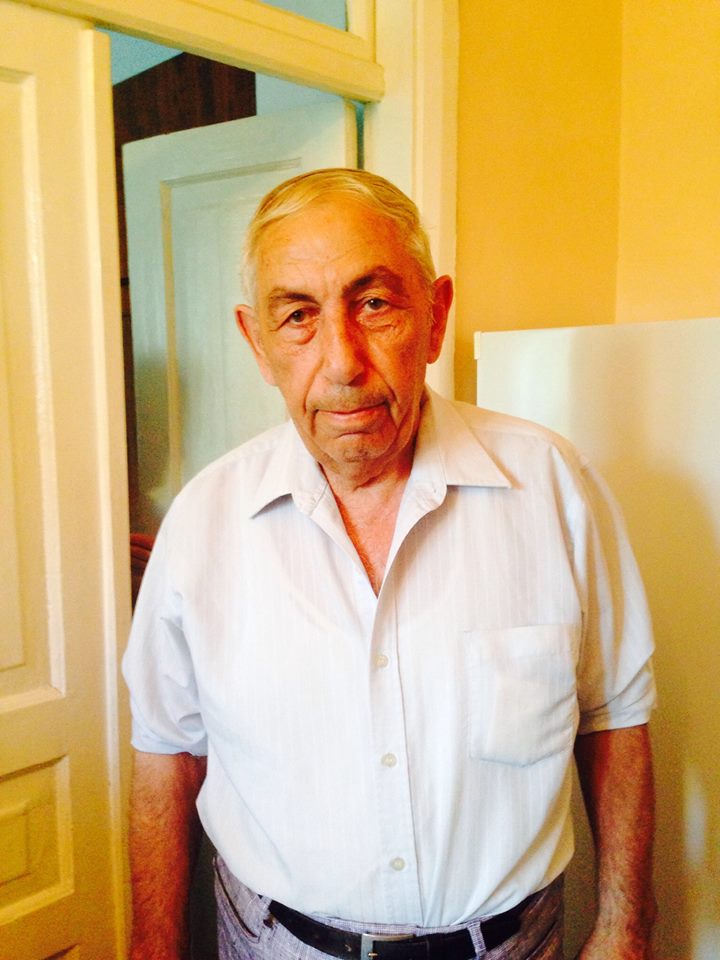 My Father Avetis Suvaryan was born in 1901 in the town of
My Father Avetis Suvaryan was born in 1901 in the town of
Father remembered they walked at night and moved to the south. In the daytime they hid in cemeteries. Sometimes they were noticed by Turkish peers with whom they occasionally had arguments. So, overcoming a lot of various hardships, they arrived in
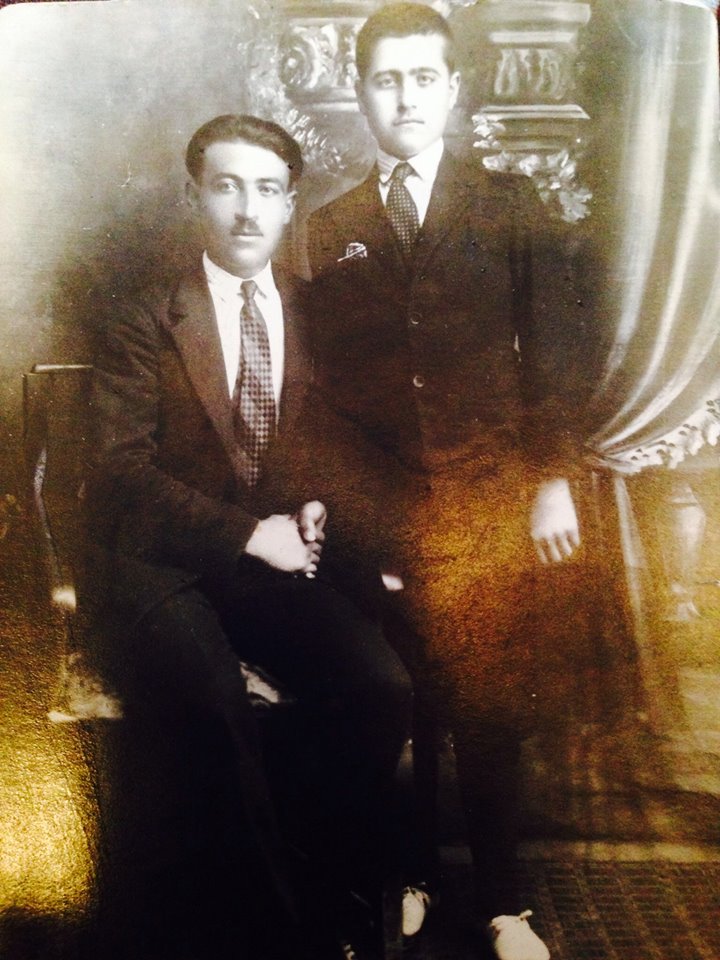 My Mother was also from an orphanage, again from Arabkir and had appeared in
My Mother was also from an orphanage, again from Arabkir and had appeared in
I was born on February 6, 1937 in
"My Mother Used to Say It Was Thanks to a Turk She Had Mother and Father"
Tells Elizabeth Katrjyan
Our family both suffered and was rescued by Turks.
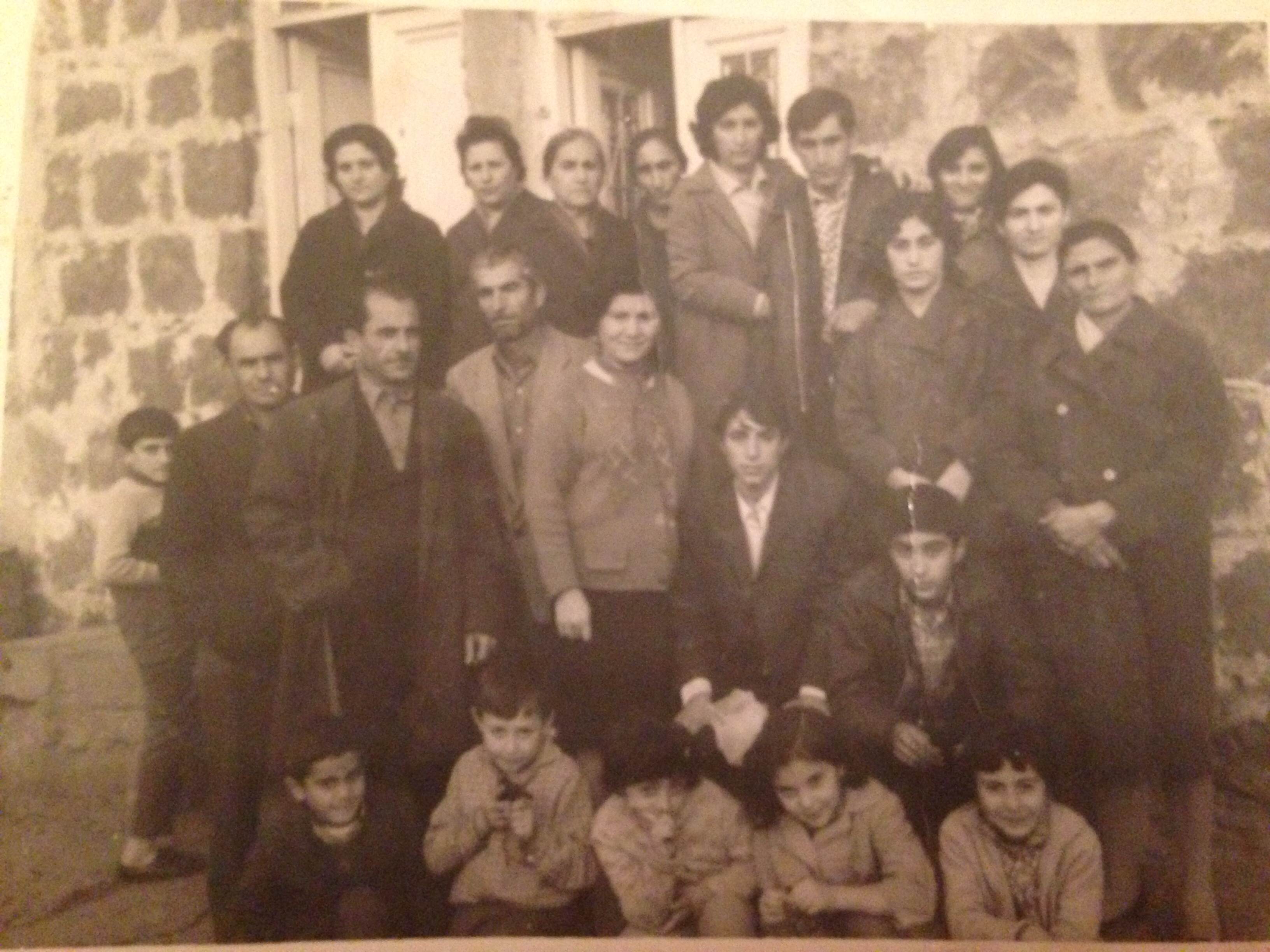 My Father, Khachik Katrjyan was from the
My Father, Khachik Katrjyan was from the
His childhood had left a heavy impact on my Father’s memory: he didn’t want to have anything during all his lifetime.
When were had grown up he used to say, "My girl, we need nothing. We just need a pit to sleep in because Turks will come… and we’ll run away again."
Later, when we were older, we found out that his family used to be quite wealthy. When we had to cook something at home he said, "My girl, such things were done by servants at our home." He told they had a beautiful, large house in their Motherland… And we got surprised.
When there was some talk at our place Father always said, "Those Turks…" and my Mother said, "It was thanks to a Turk that I had a mother and father."
My Mother’s family was from Khazkal. They were called Khazkaltsiner [Khazkal residents, tr.]. My Grandfather and Grandmother – Harutyun and Satenik – were Dodozyans: Dodozyan is not a surname, but the name of the neighborhood Dodozlar. Once they were registered in that way and became Dodozyans.
My Mother, Haikanush was born in 1914. During the carnages of 1915 they were constantly exiled from one village to another.
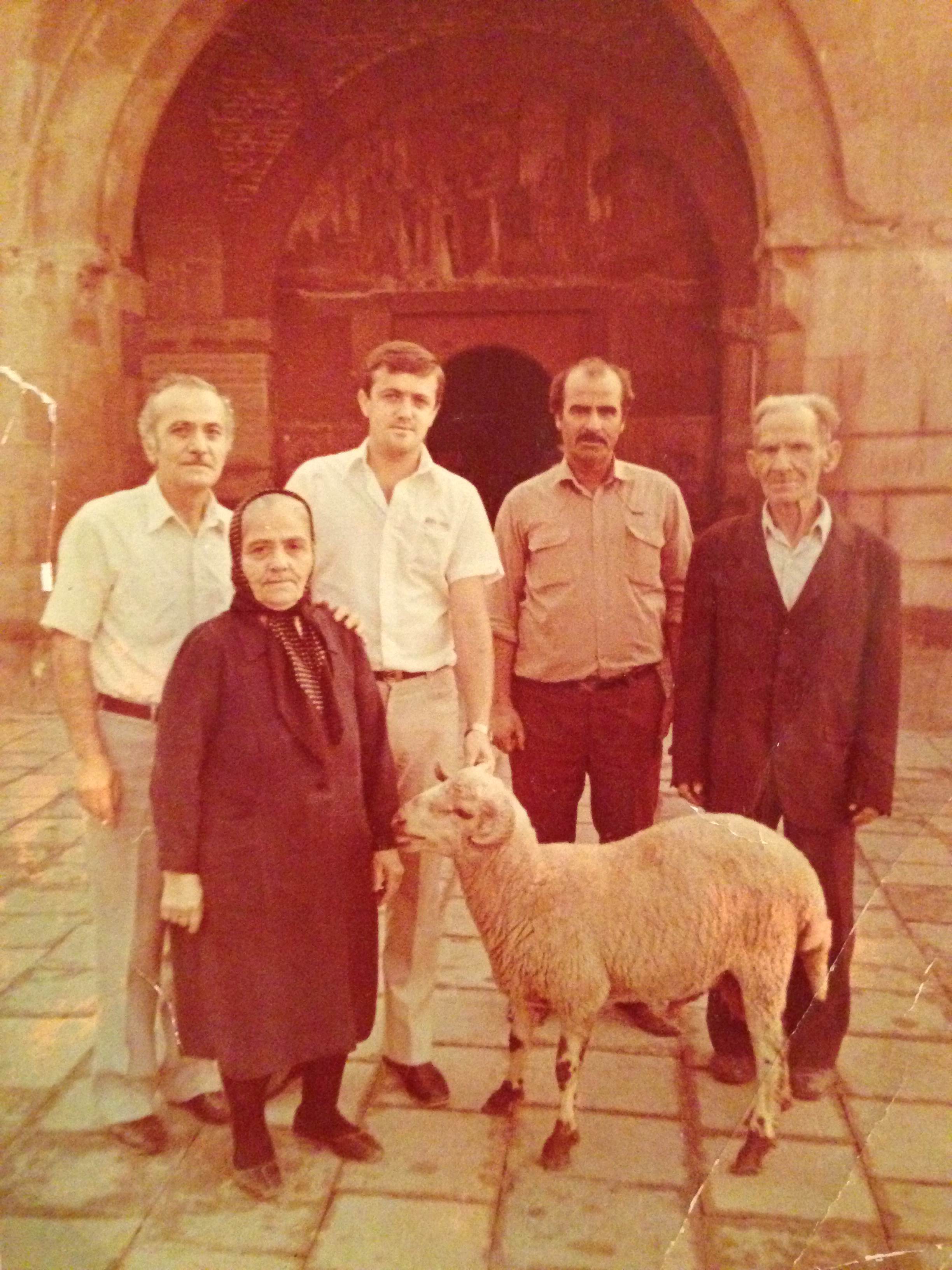 In one of such villages the Khoja's sixteen-year-old son was stabbed and my Grandfather's name was given, as if he had done that. When the boy's relatives came with fire and swords to exterminate my Grandfather's whole family their Turkish neighbor, who was one of the rich people of the village, came up and said, "No, Harutyun was here at that time." This is how my Mother's family had a narrow escape.
In one of such villages the Khoja's sixteen-year-old son was stabbed and my Grandfather's name was given, as if he had done that. When the boy's relatives came with fire and swords to exterminate my Grandfather's whole family their Turkish neighbor, who was one of the rich people of the village, came up and said, "No, Harutyun was here at that time." This is how my Mother's family had a narrow escape.
Covering the roads of exile they appeared in
My Mother was able to be brought up by her parents thanks to that Turk and always remembered about this.
My Father also migrated to
''My Father Lived 13 Years in the Turk's house Who Saved Him''
Tells Ohannes Kulak Avetikyan
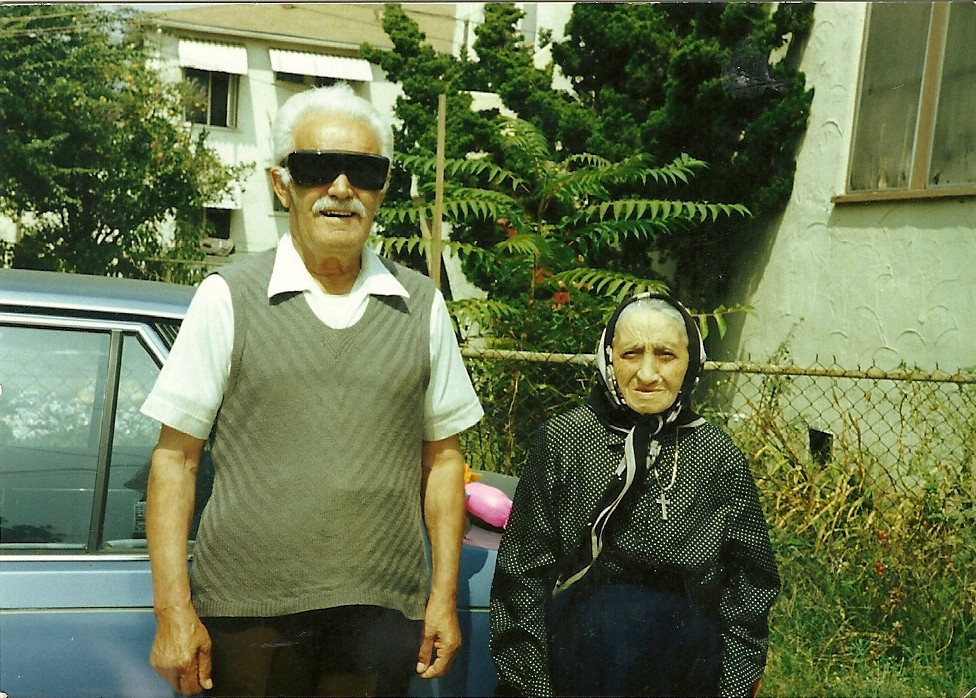 My Father's name is Manuk, Manuk Grigor Avetikyan: he was a respectable person in Cesaria in modern Yozghat province. There was an Armenian school, a church and a college in the
My Father's name is Manuk, Manuk Grigor Avetikyan: he was a respectable person in Cesaria in modern Yozghat province. There was an Armenian school, a church and a college in the
My Father’s ancestors came from Ani. But when in 1021 King Senekerim moved to Sebastia, my ancestors migrated with everybody.
My Father’s village was called Hyurnej meaning "the guest descended in the forest". A meadow opened in that place and a village was built in that meadow. There is still a forest in those places until now. Mount Akta stands nearby, where Armenian Fedayeens from both my Mother’s and Father’s dynasties fought.
My Father’s dynasty was Avetikyan, Grand Father’s name was Avetik. Avetik was "a daredevil" person, just like daredevils of Sassoun. Once tax collectors came to my Grand Father for tithe and he paid. But when they came again to collect taxes, he didn't pay saying he had already paid once. The tax collector said he had to pay again; Grandfather got angry and beat the bailiff. The incident was reconciled as my Grandfather knew some people. However, some time later the same bailiff again came to Grand Father, now under Pasha's auspices. Avetik refused to pay again and beat the tax collector. Grandfather was punished: his ear was cut as he refused to obey. From then our family nickname was Kulaksyzyan, meaning without an ear.
In 1915 my Father was only 12 when his Father, Mother, sister and elder brother were killed before his eyes.
... Father had nightmares every night with scenes of his family's assassination.
A Turk called Sherket, wishing to save the children, took my Father, Manuk, and his younger sister, Dalita. That man, however, said the children could live in his family only if they were Turkified. Manuk had to change his name and become Sherket. That Turk kept my Father and his sister for some time. Then Father gave Dalita to an orphanage. But he didn't go there himself.
He thought the lands left by his Father belonged to him and wanted to own them. His sister was moved to
My Father, Manuk lived 13 years with the Turk who sheltered him. He spent summers in the fields, winters in the stable. He said the Turk had a daughter of his age with whom he grew up. That Turk also advised him to take care of his Father's land.
One day Manuk went to his paternal house where he met a stranger who insisted those were his lands. The Turk who brought Manuk up talked to that stranger and said the child's whole family was killed and asked if it was possible to leave the land to him. They came to an agreement and Manuk went to get the certificate of the owner of the land. There he was told as his Father hadn't obeyed the authorities those lands no longer belonged to him but were already state property. So my Father burnt the papers with his own hands saying that as everything was taken away from him, then they could have that just as well...
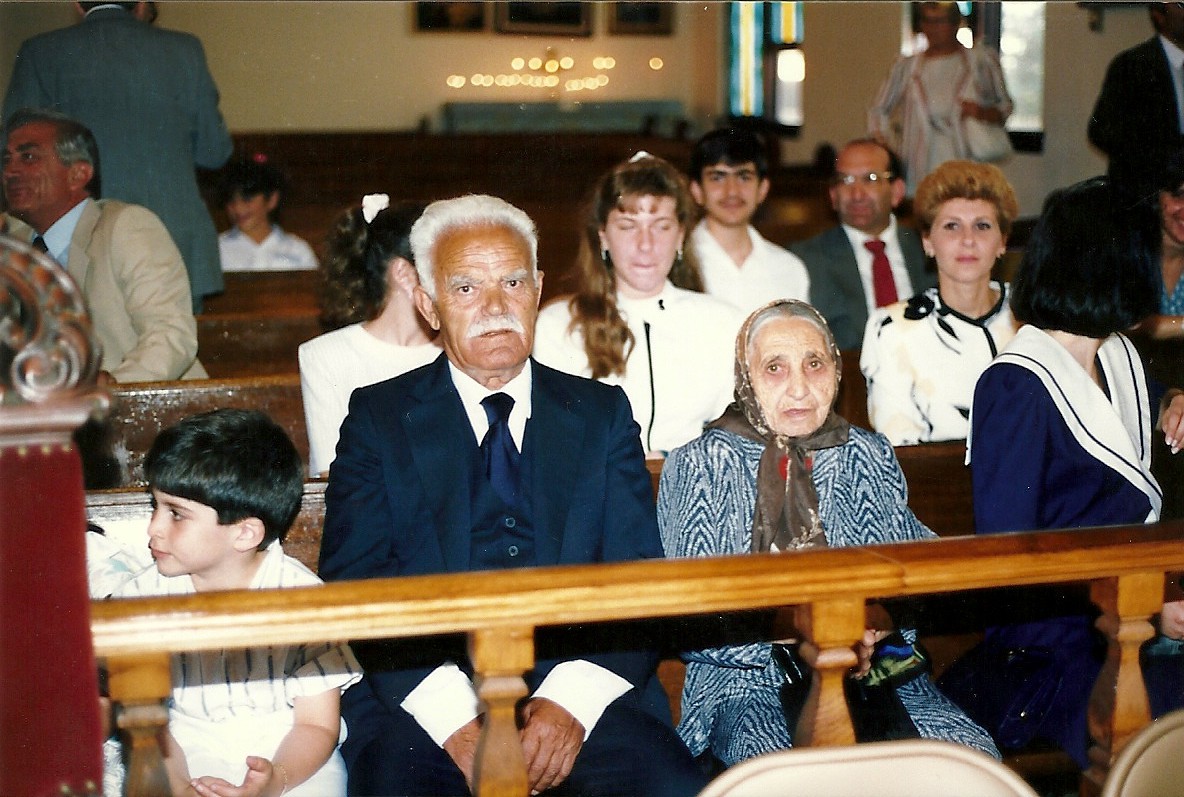 Manuk's other sister called Tsiatsan [Rainbow, tr.] had married a Turkish cleric but they often met. One day my Aunt's Turkish husband told my Father that there was a converted Armenian girl who offered to marry him. That girl was my Mother – Armanush, who was "a daredevil" Melkonyan. As part of the Turkish army her Father took part in Chanakale war that is why he was exiled later. My Mother Armanush was saved by Circassians who spoke in the Ivonese language. I know the Ivons are a part of Circassians but they were Turkified. When my Grandfather returned from the war, he found the village empty. My mother Armanush was renamed to Anishe and Grandmother Hripsime was renamed Gyulsima. So my Grandfather joined them under the name Yakub. Later their two younger daughters were born. After her husband's death Hripsime returned to the
Manuk's other sister called Tsiatsan [Rainbow, tr.] had married a Turkish cleric but they often met. One day my Aunt's Turkish husband told my Father that there was a converted Armenian girl who offered to marry him. That girl was my Mother – Armanush, who was "a daredevil" Melkonyan. As part of the Turkish army her Father took part in Chanakale war that is why he was exiled later. My Mother Armanush was saved by Circassians who spoke in the Ivonese language. I know the Ivons are a part of Circassians but they were Turkified. When my Grandfather returned from the war, he found the village empty. My mother Armanush was renamed to Anishe and Grandmother Hripsime was renamed Gyulsima. So my Grandfather joined them under the name Yakub. Later their two younger daughters were born. After her husband's death Hripsime returned to the
My Father cautioned me never ever to go to Hyurnej as he had witnessed such painful events there.
Then Father moved to Cesaria with his family. Some years later they migrated to the
After he had told me the story O. Avetkyan tried to find their village on the Internet to show me. While doing that he and his son found a video telling about Hyurnej. Father and son began to watch the video with excitement and, to my surprise, recognized their paternal house and the meadow they had heard about so many times but had never visited. At the end of our conversation my interlocutor sang touching songs smoothly passing from Armenian to Turkish: both languages are native for him.
"The Story of How My Mother Survived the Genocide Reminds of a Miracle"
Tells Donara Tarjumanyan
The story of how my Mother survived the Genocide reminds of a miracle, a real miracle…
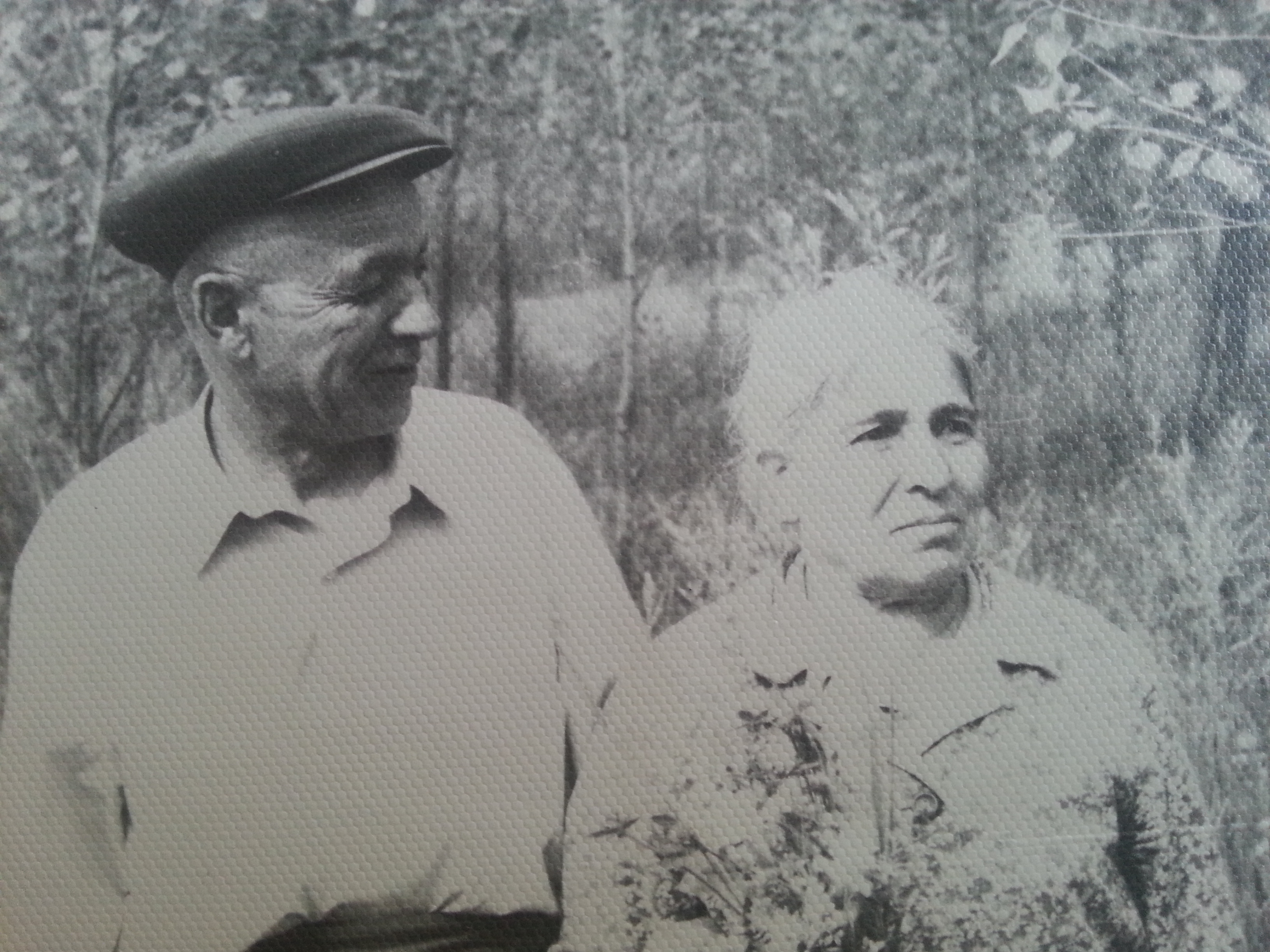 It was certainly a miracle to stay alive, to survive in those almost inhuman circumstances, to avoid the yataghan and later to set a family, to live happily…
It was certainly a miracle to stay alive, to survive in those almost inhuman circumstances, to avoid the yataghan and later to set a family, to live happily…
I don’t even know if my Mother’s life could be called a happy one. The disaster she went through during her childhood, the violence she witnessed were always in her eyes… My Mother was a survivor of the Genocide…
My Mother Siranush Hakobyan was born in 1912 in
A vast majority of the Armenians in
All the three of them were taken away but they didn’t know where. It was only some time later that the orphans realized they had been saved. Finding themselves in a large palace they met their uncle’s daughter Aghavní.
Agahvní’s story is also interesting. A Turkish Pasha had seen her during the massacre years and fallen in love. Agahvní had married that Turk, moved to his fortress. However, the girl was always sad… The Turkish Pasha wanted to do something for her to feel happy. So Agahvní asked to save her cousins from the carnage. The Turk Pasha, as you see, fulfilled his wife’s wish and saved the Armenian orphans.
My Mother and uncles were received very well in that Turk’s house; they were given new clothes and fed. Mother couldn’t remember definitely but she said they stayed quite long there, about a year they lived in that house until Turks learnt about Pasha’s action and started persecuting him. Pasha took his wife Agahvní and left the place, thus leaving the orphans alone again.
I don’t remember where my Mother and her brothers went from there but in the end they found their uncle’s [father’s brother, tr.] wife – Agahvní’s mother. With her help they moved to Gyumry.
Mother told that after living in Gyumry for some time the news spread that Turks had left Kars and all refugees could return (perhaps it happened in 1919 when the Armenian army liberated Kars for a short period).
Hearing the news about the liberation of
My Mother and her elder brother were brought to
"My Great Grandfather Had Two Hours to Leave Van"
Tells Alik Sargsyan
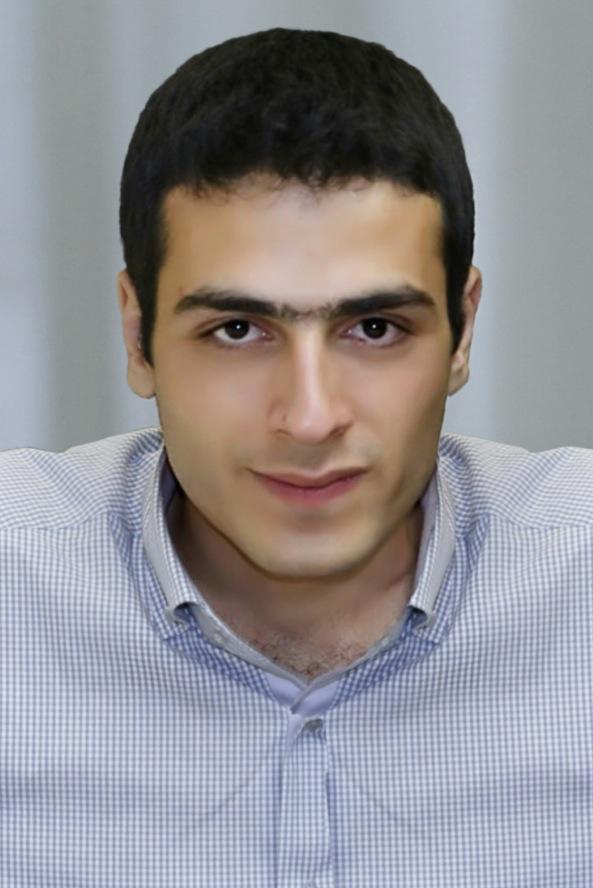 I have heard this story from my Mother. However it was only recently that I learned more details about the life of her Grandfather’s family in Van and how they were miraculously saved from the massacres. My ancestors migrated from the city of
I have heard this story from my Mother. However it was only recently that I learned more details about the life of her Grandfather’s family in Van and how they were miraculously saved from the massacres. My ancestors migrated from the city of
This story is about my Mother’s Grandfather, who was born and lived in Van till the carnage of 1915.
Nikoghos Grigor Charkhchyan was born in 1884. After finishing school, he became a barber. He had one daughter. Although he was fond of his profession, he was also engaged in many other business activities. Due to his hard work and great will, he became the owner of big hotels, hair salons and teahouses.
He had very tight connections with many Turks because of the nature of his work and was in very good relations with many of them. Grandfather Nikoghos and his family were in very close relations with the Turks in their neighborhood. Nevertheless, even these relations changed when the massacres by Turks began.
In April 1915 Nikoghos was in one of his hotels, when a Turk officer in military clothing approached him and warned that he had 20 minutes to leave his house and 2 hours to leave Van. My Mother told me, that it was very strange, that a stranger, whom my great Grandfather did not know at all, warned him about this. However, this kind of news terrified my Grand-grandfather and he hurried to leave Van with his family as soon as possible. Grandfather Nikoghos took with him what he was able to take in 20 minutes – some first necessity things and gold. Nikoghos with his wife, his 2-year-old child and parents escaped leaving all his property to Turks.
Unfortunately, they were not lucky enough to escape without losses. On their way the Charkhchyan family was not only robbed, but they were also persecuted and Nikoghos’ parents died of cholera. My Great Grandfather was able to get to
"Turkish Friends Accompanied My Aunt's Family to
Tells Hamestuhy Qendikyan
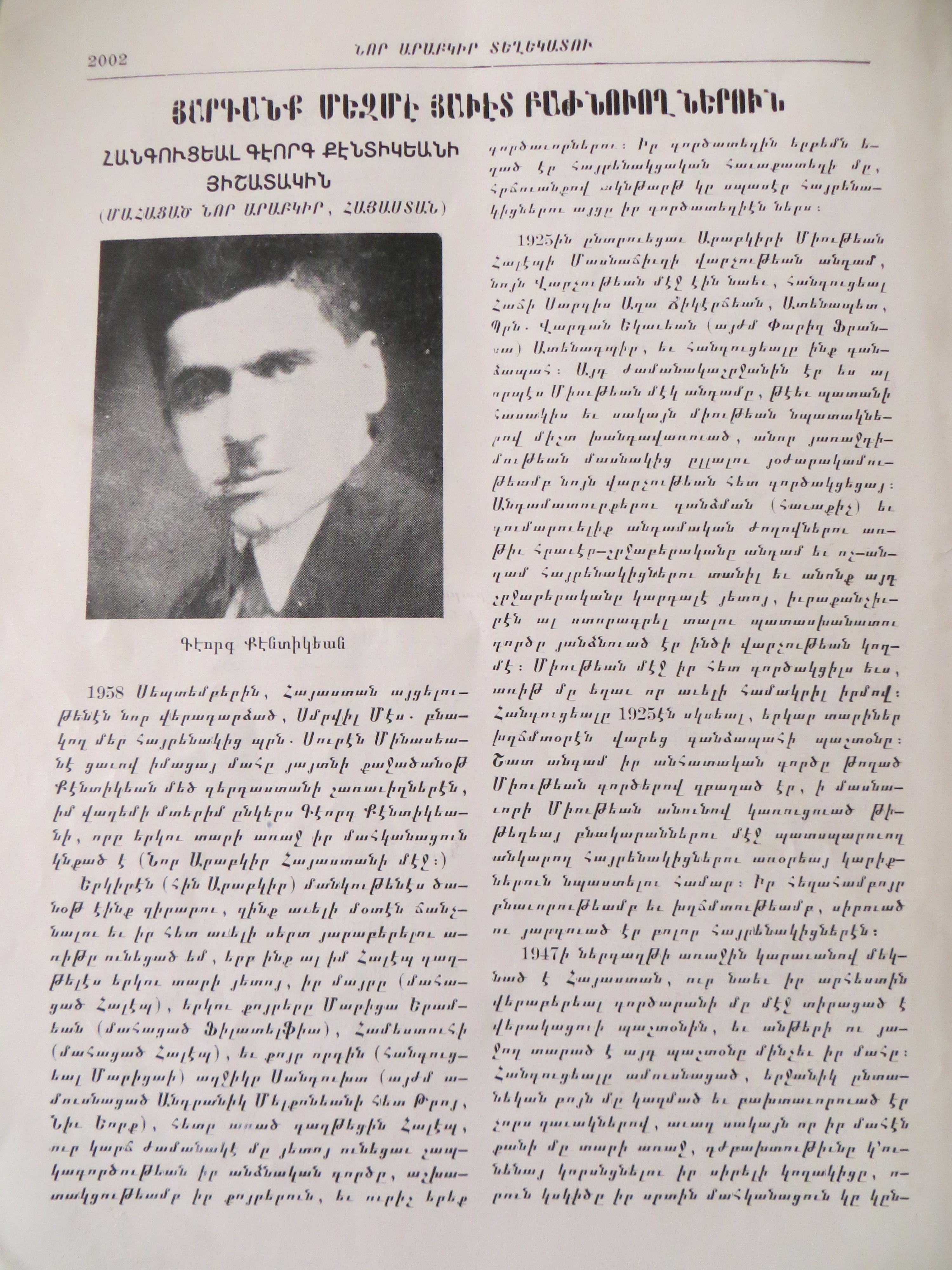 My parents used to live in the city of
My parents used to live in the city of
My grandmother used to tell that after the war was over all Armenians from Arabkir went to
My Father used to tell about the circle of his friends. He said he had several Turkish friends who, as he used to say, always gave a hand when needed; they didn’t let anyone harm us. I can still remember the name of one of his friends was Mstatevik. I asked him: "What name is that?" and he used to answer, "A Turk’s name".
And my aunt [Father’s sister, tr.] Tigranuhy’s husband Sargis Suryan said that during the massacres their family were in the mountains and made horseshoes. Among all that turmoil they were forgotten and weren’t exiled. They returned to Arabkir when the situation eased in 1924, then they migrated to
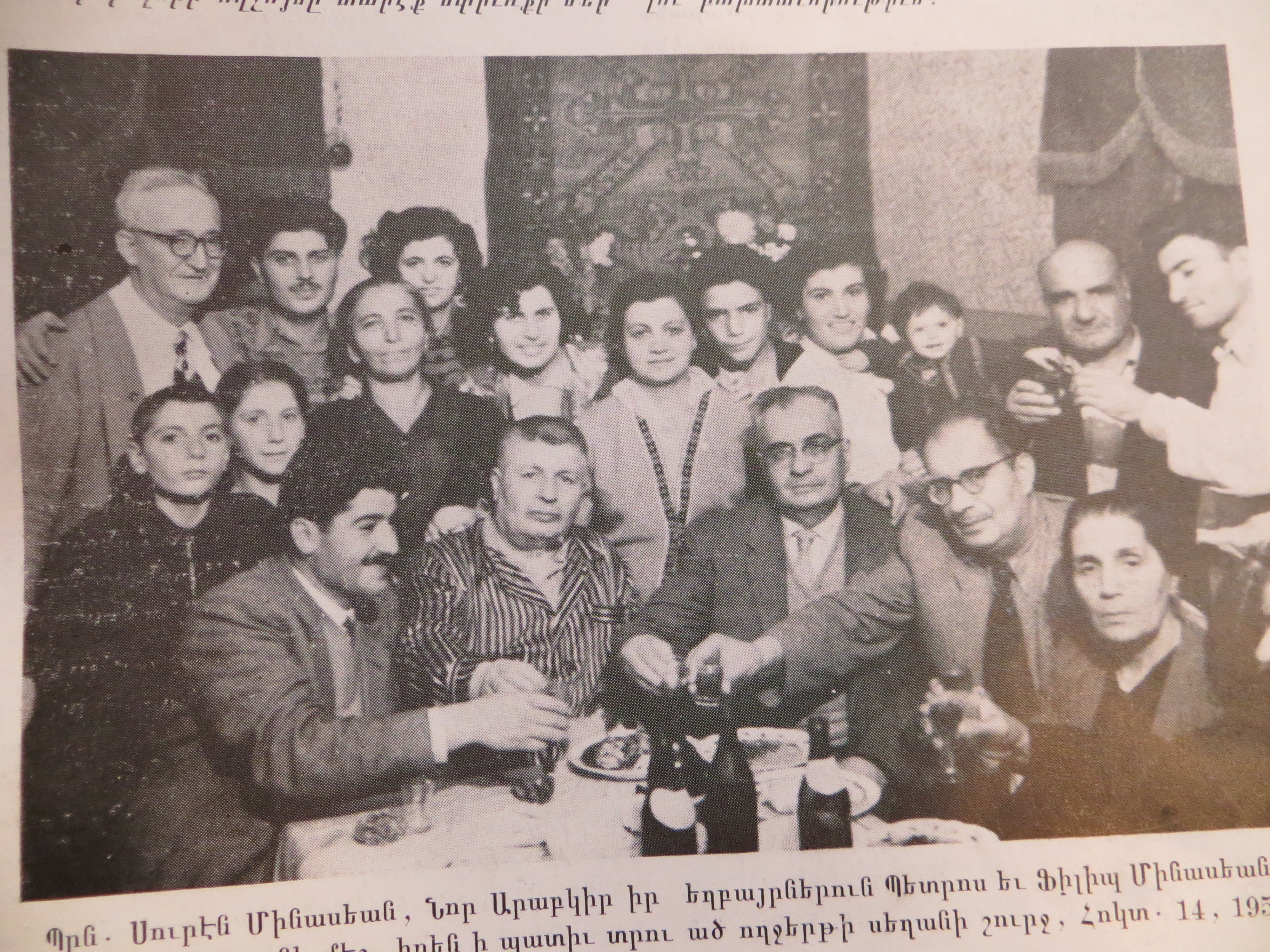 Some Turks helped them run away. My Aunt’s husband used to remember how their Turkish friends took all the jewelry they had, hid it in their pockets, tied their carpets and belongings to the mules and accompanied them to the border with
Some Turks helped them run away. My Aunt’s husband used to remember how their Turkish friends took all the jewelry they had, hid it in their pockets, tied their carpets and belongings to the mules and accompanied them to the border with
In
My Aunt’s husband always remembered these Turks with gratitude. He said they had very good Turkish neighbors who "took care, didn’t allow marauding". But there were also cruel people who took advantage to assassinate and rob. In any case I have often heard that among Turks there were so many people who were helpful.
"When the Great Massacre Began a Turk Neighbor Sheltered my Grandmother’s Family"
Tells Suren Avetisyan
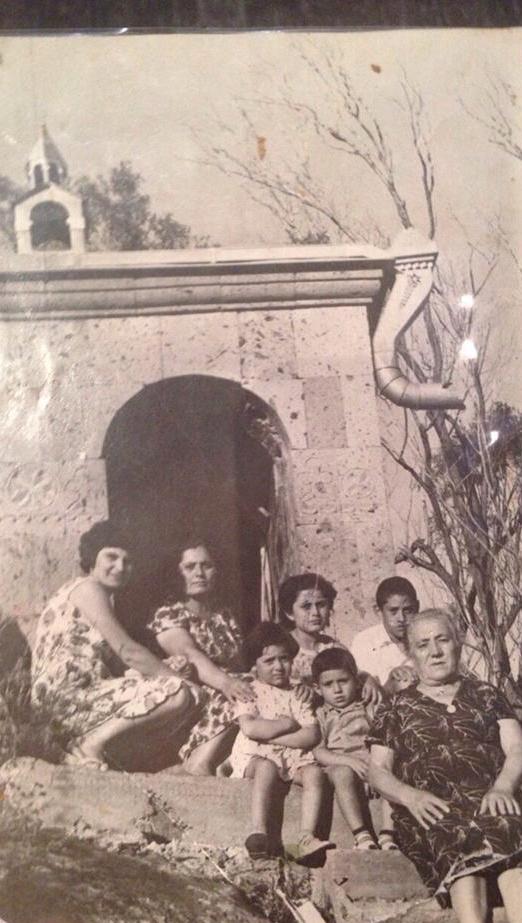 My Grandmother Siranush Hambartzumyan was born in 1905. She was from the
My Grandmother Siranush Hambartzumyan was born in 1905. She was from the
Grandmother used to say, "Certainly, they were Turks but they were very nice people. Our families were so close. They were people of bread and salt [this expression means "hospitable", tr.]."
However their Turkish neighbors couldn’t hide Grandmother’s family too long. Thus, like thousands of other Armenians they also had to leave Artamet.
On the road of exile two soldiers approached my Grandmother’s younger sister and tried to take the silver ring off her finger. As it was tight and wouldn’t come out one of them raised his dagger and wanted to cut off the finger. At that very moment another Turkish soldier came up and didn’t allow. In the end, they put some water on the ring and were able to take it off the finger.
But later, getting too exhausted from hunger and tiredness Grandmother’s sister and mother died on the way of migration.
Grandmother told that walking on the road some people fell down exhausted and everyone knew that the fallen one would never get up again.
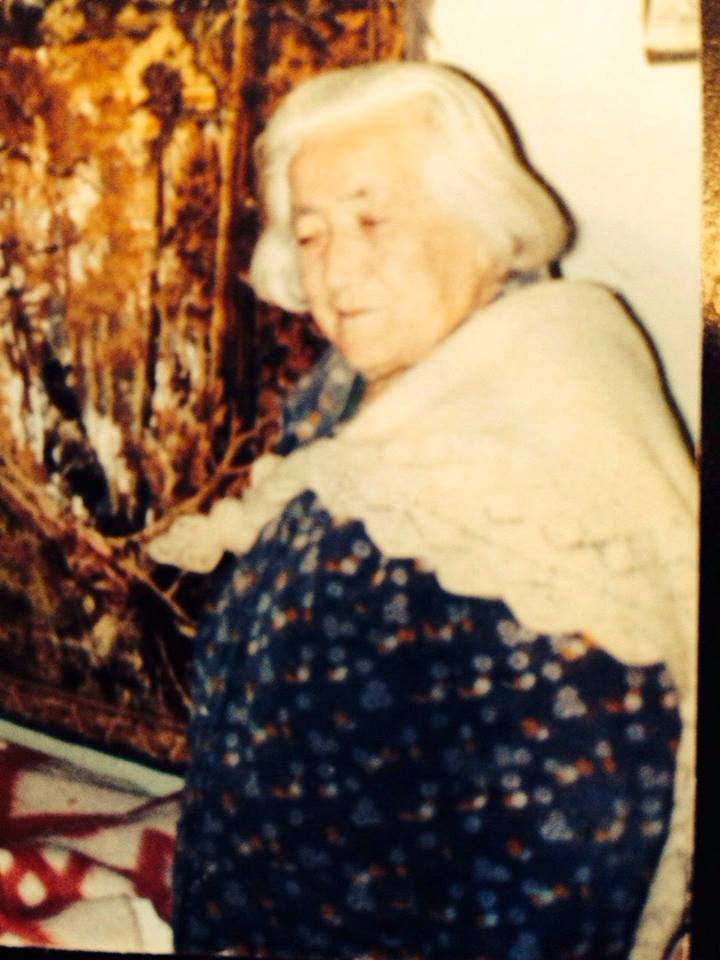 The group of Armenian refugees, and my Grandmother among them, was able to cross the
The group of Armenian refugees, and my Grandmother among them, was able to cross the
I can still remember when our family came together and Grandmother started to speak about her childhood she always told about their lost house and village with a feeling of yearning. She would talk about the apples of Artamet with special admiration. She said that young women in Artamet always kept apples in chests: when they opened the chest the scent of apples would spread around the room…
She wanted so much to visit her native Artamt at least once. She had left that place when she was only nine but she looked confident when she would say, "If my feet get to our village again I will instantly find our house." Unfortunately, that big wish of my Grandmother never came true.
People from Van are usually considered greedy but Grandmother was really very generous. Everyone who knew her used to ask, "You come from Van, how can you be so hospitable?" in answer to which she would say, "People from Van are not greedy, simply they always have their stock for tomorrow."
"My Grandmother’s Father Was Saved by His Commander"
Tells Grigor Avetisyan
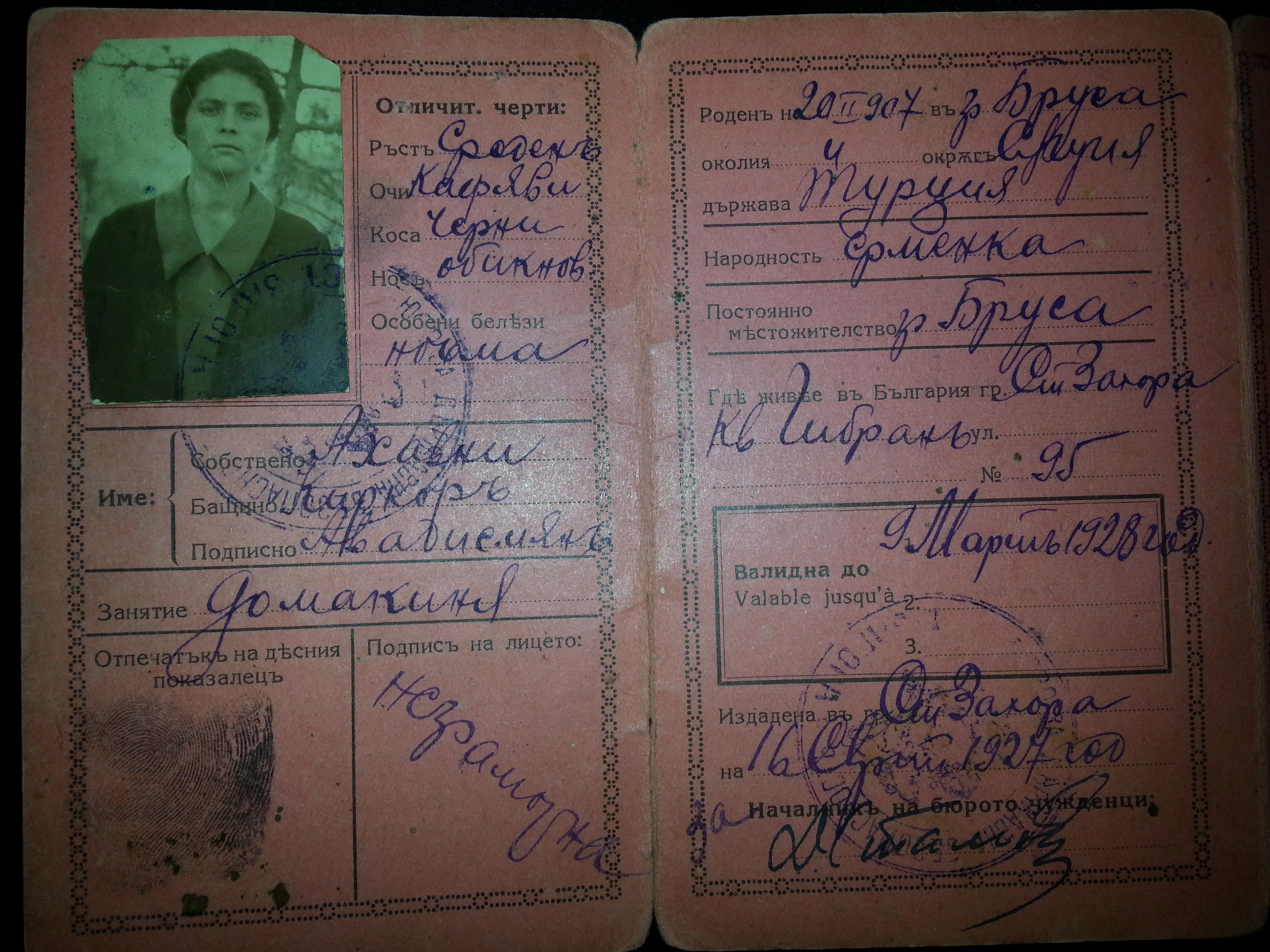 My Grandmother Aghavný Martirosyan, born in 1907, was one of those who miraculously survived the Armenian Genocide. Grandmother and her family lived in the
My Grandmother Aghavný Martirosyan, born in 1907, was one of those who miraculously survived the Armenian Genocide. Grandmother and her family lived in the
Soon their turn came. The four women – Grandmother, her mother, grandmother and aunt – took their seats on the train. Grandmother told they put ash on their faces to look ugly as beautiful girls were taken away by Turks. When Grandmother and her family were already in the train a young man got on the train and asked if there was anybody from
They started to work at the market. They did trivial jobs to earn at least some living. And it was at the market they came across my Grandmother’s father Grigor. They met absolutely by chance as everyone knew that Turks killed Armenian men recruited to the army. But it turned out grandmother’s father was rescued by his Turkish commander. The latter, knowing well that Grigor was a professional farmer, took him to his estate to work as a gardener. Actually, my grand-grandfather’s salvation became possible thanks to a Turk. After the reunion the family moved to live in their native Charakh. They lived there for about two years and in 1922 during the retreat of the Greek army moved to
"Run, Go, Keep My Light Burning"
Tells Anahit Ghazaryan
When I learnt about the project "100 Years… Real Stories" one of my ex-students, Susanna Stepanyan, was at my place. During the conversation I told her about the project and found out that Turks had saved her Grandfather during the Genocide. She told me the story of her paternal Grandfather.
They came from Shatakhy. Her Grandfather was 13-14 years old during the Genocide years. Turks gathered all residents of Shatakhy and locked in the church intending to burn them. As Susanna said her Grandfather’s family was quite large. Her Grand-grandfather Stepan, feeling what destiny his family, including his son Hakob, would have, tried to find a way out. But what could he do when everybody’s hands were tied behind? Suddenly he noted that one of the church walls had a crack and the stone could be removed. Hakob’s father started hitting the wall with his back and hands. Even at that moment he didn’t forget his religion and didn’t hit with his legs: it is a sin to hit a church wall with one’s leg. His wife was crying asking him to do something and save their son, her Hakob.
In the end, he managed to remove a stone from that church that had been standing for centuries and told his son, "Run, go, keep my light burning." [in Armenian that expression means to continue the family, tr.] Hakob was a thin boy and, prowling through that hole in the church wall, he began running. Suddenly he heard a Turk yelling, "The giaour’s son ran away." Then a shot followed… Hakob felt his hands tied behind his back get warmer but he kept running frantically. He ran without knowing where he had got. Then he suddenly fell unconscious.
Waking up Hakob found himself in a Turk’s house. A pregnant Turkish woman stood beside him and his hands were tied with some rags. At that moment he realized he was wounded but the first thought he had was that he was free, that he had run away. The Turkish woman fed him and made him hide as the boy was searched for everywhere. The woman offered Hakob to lie under the bedding. Soon he could hear Turks yelling and the woman’s answer who assured them the boy wasn’t in her house. In the end the soldiers went away. Then the Turkish woman gave the boy some food, showed him a safe way to take. This is how Hakob, the son of Stepan from Shatakhy survived and years later told his grandchildren, "When I was going away I smelt something burning. I turned back… The church was burning…"
He ran and got to the
"Two Offshoot Survivors of Exterminated Dynasties Vowed to Weave Together and Become a Thick Oak"
Tells Elizabeth Baltayan
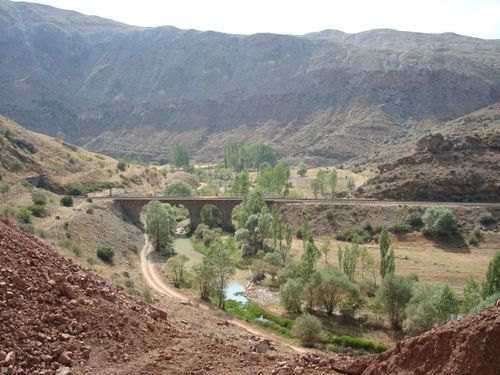 My Mother Azniv Baltayan was from the city of
My Mother Azniv Baltayan was from the city of
Mother told they had a Turkish neighbor who was very close to them. One evening, when men were away, that Turk Pasha visited them. Mother used to say he was like a family member. That Pasha's mother had died during childbirth and Azniv's grandmother Nazik had taken care of and brought him up like her own son. The Turk used to call Nazik "Great Mom".
My Mother Azniv was six then. She and her two sisters went out to meet the guest and heard the conversation. When the Turk came in and seated himself by the table he told "Great Mom" Nazik that "the Turkish government had made a decision to displace the Armenian population, to assassinate and exterminate the Armenian nation". He offered Nazik shelter in his house and even promised a corner for icons where Nazik Mom could pray. He said he would be able to protect all their family as he had certain advantages. Everybody was anxiously waiting for Nazik's respond. And she refused saying her dynasty and family would be wherever the Armenian nation was; if Armenians were to be exterminated let their family be killed out either. Upon hearing this, the Turkish Pasha went away and never returned; and a few days later happened what he had spoken about.
In April Baltayan dynasty set off on the road of exile in line with other Armenian families. As my Mother was too young she was carried. She easily got tired and asked her Grandmother to stop to eat or drink water. During an incident on the road one of her sisters was killed right before her eyes: she was beheaded and thrown into the water, which was really awful for my Mother.
At some point the caravan of migrants stopped. Everybody noticed certain change in the Turkish soldiers' attitude towards them: they did nothing violent, just, on the contrary, urged Armenians to walk slowly and without haste as they had a long way to cover.
However, everybody understood the reason for the Turks' cunning steps when they saw employees of an American orphanage.
The Americans collected children under age and my Mother Azniv appeared among them. After seeing her sister's death with her own eyes, Mother could hardly depart with her grandmother and other sister. "Set your own family and never forget your dynasty," said Grandmother Nazik hugging Azniv dearly. "Always keep in mind the road of your sufferings."
From the truck moving away my Mother was watching the long-long caravan trying to find her sister and grandmother.
Mother married Azaria Patrakchyan who was also from Sebastia, from the
This story was published also in The Khariskh [Anchor, tr.] magazine, March/April, 2005, under the title "The Fresh Oak Offchoot".
Other materials on this subject
- FM of Luxembourg Visited Armenian Genocide Memorial Asselborn has arrived in Armenia for an official visit at the invitation of Armenian Foreign Minister Edward Nalbandian. He will have meetings with Armenia’s President Serzh Sargsyan and will visit the...
- An Armenian Living in Turkey: The Events of 1915 Cannot Be Forgotten What refers to the future, then I hope that the Armenians and Turks will reconcile in the end. The problem is between the governments and they must resolve it
- Armenian Living in Turkey: Advocacy for Brotherhood Should Be Done at the State Level to Sound More Convincing The country already has problems connected with human rights and freedom of expression, which for Armenians are doubled.
- French Senate Will Discuss Bill Criminalizing Armenian Genocide Denial in Early October "We work in order the required number of MPs to vote for the bill. You know the Turks are not indifferent, they also work, do everything in order that option not to be adopted."
- Genocide Education Bill in the US State Michigan Signed into Law "I am elated we finally accomplished making this important genocide educational program into Michigan law," Jamian said. "This success demonstrates that when our community leaders all work together we...
-
 17:08
17:08The regular session of the Anti-corruption Policy Council takes place in Jermuk
-
 15:05
15:05The Prime Minister sends congratulatory messages to the supreme leader of Iran and the President of Iran
-
 11:11
11:11Armenia sends earthquake aid to Turkey
-
 10:43
10:43Commemoration of the Pontiff St. Sahak Partev
-
 09:16
09:16Some roads are closed and difficult to pass in Armenia
-
 19:55
19:55Phone conversation of the Foreign Minister of Armenia with the U.S. Assistant Secretary of State for European and Eurasian Affairs
-
 18:30
18:30Prime Minister Pashinyan and President Khachaturyan meet
-
 18:20
18:20Ararat Mirzoyan with Co-Chairman of the OSCE Minsk Group of France Brice Roquefeuil
-
 17:01
17:01Humans could land on Mars within 10 years, Musk predicts
-
 16:45
16:45France, US urge 'immediate' end to Nagorno Karabakh blockade
-
 16:01
16:01Blockaded Nagorno Karabakh launches fundraiser to support quake-hit Syria
-
 15:59
15:59Earthquake death toll in Turkey rises to 18,342
-
 15:43
15:43Ararat Mirzoyan Held a Telephone Conversation with Sergey Lavrov
-
 15:06
15:06French president rules out fighter jet supplies to Ukraine in near future
-
 14:47
14:475 Day Weather Forecast in Armenia
-
 14:44
14:44President Vahagn Khachaturyan wrote a note in the book of condolences opened in the Embassy of Syria in Armenia
-
 14:20
14:20Azerbaijan’s provocations impede establishment of peace and stability – Armenian FM tells Russian Co-Chair of OSCE MG
-
 12:57
12:57France representation to OSCE: Paris calls on Azerbaijan to restore freedom of movement through Lachin corridor
-
 11:40
11:40Command of Kosovo forces highly appreciated preparation of Armenian peacekeepers
-
 10:16
10:16The United States withdrew from sanctions against Syria for six months the provision of assistance after the earthquake
day
week
month
Humidity: %
Wind: km/h

